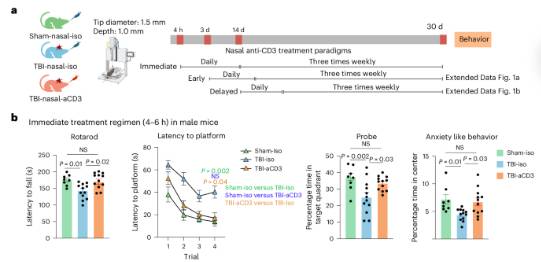
鼻用抗CD3单克隆抗体通过IL-10依赖性Treg-小胶质细胞串扰改善创伤性脑损伤,增强小胶质细胞吞噬作用,减少神经炎症,这一成果由布莱根妇女医院Howard L. Weiner研究团队经过不懈努力而取得。该研究于2025年2月27日发表于国际一流学术期刊《自然—神经科学》杂志上。
在本研究中,研究团队发现鼻腔给药抗CD3单克隆抗体可改善缺血性脑损伤模型的中枢神经系统损伤和行为缺陷。鼻腔抗CD3诱导产生白细胞介素(IL)-10的调节性T细胞(Treg细胞)迁移到大脑并与小胶质细胞密切接触。Treg细胞直接减少慢性小胶质细胞炎症,并以IL-10依赖的方式调节其吞噬功能。在体内整体或特异性地阻断IL-10受体对小胶质细胞的作用,会取消鼻腔抗CD3的有益作用。
然而,将产生IL-10的Treg细胞过继转移至TBI损伤小鼠,通过增强小胶质细胞吞噬能力和减少小胶质细胞诱导的神经炎症,恢复了这些有益作用。这些发现表明鼻腔抗CD3是治疗TBI和潜在的其他形式急性脑损伤的一种有希望的新治疗方法。
据介绍,神经炎症在创伤性脑损伤(TBI)中起着至关重要的作用,有助于损伤和恢复,但目前还没有有效的治疗方法来减轻中枢神经系统(CNS)损伤并促进TBI后的恢复。
附:英文原文
Title: Nasal anti-CD3 monoclonal antibody ameliorates traumatic brain injury, enhances microglial phagocytosis and reduces neuroinflammation via IL-10-dependent Treg–microglia crosstalk
Author: Izzy, Saef, Yahya, Taha, Albastaki, Omar, Abou-El-Hassan, Hadi, Aronchik, Michael, Cao, Tian, De Oliveira, Marilia Garcia, Lu, Kuan-Jung, Moreira, Thais G., da Silva, Patrick, Boucher, Masen L., Beauchamp, Leah C., S. LeServe, Danielle, Brandao, Wesley Nogueira, Carolina Duro, Ana, Lanser, Toby, Montini, Federico, Lee, Joon-Hyuk, Bernstock, Joshua D., Kaul, Megha, Pasquarelli-do-Nascimento, Gabriel, Chopra, Kusha, Krishnan, Rajesh, Mannix, Rebekah, Rezende, Rafael M., Quintana, Francisco J., Butovsky, Oleg, Weiner, Howard L.
Issue&Volume: 2025-02-27
Abstract: Neuroinflammation plays a crucial role in traumatic brain injury (TBI), contributing to both damage and recovery, yet no effective therapy exists to mitigate central nervous system (CNS) injury and promote recovery after TBI. In the present study, we found that nasal administration of an anti-CD3 monoclonal antibody ameliorated CNS damage and behavioral deficits in a mouse model of contusional TBI. Nasal anti-CD3 induced a population of interleukin (IL)-10-producing regulatory T cells (Treg cells) that migrated to the brain and closely contacted microglia. Treg cells directly reduced chronic microglia inflammation and regulated their phagocytic function in an IL-10-dependent manner. Blocking the IL-10 receptor globally or specifically on microglia in vivo abrogated the beneficial effects of nasal anti-CD3. However, the adoptive transfer of IL-10-producing Treg cells to TBI-injured mice restored these beneficial effects by enhancing microglial phagocytic capacity and reducing microglia-induced neuroinflammation. These findings suggest that nasal anti-CD3 represents a promising new therapeutic approach for treating TBI and potentially other forms of acute brain injury.
DOI: 10.1038/s41593-025-01877-7
Source: https://www.nature.com/articles/s41593-025-01877-7
Nature Neuroscience:《自然—神经科学》,创刊于1998年。隶属于施普林格·自然出版集团,最新IF:28.771
官方网址:https://www.nature.com/neuro/
投稿链接:https://mts-nn.nature.com/cgi-bin/main.plex
